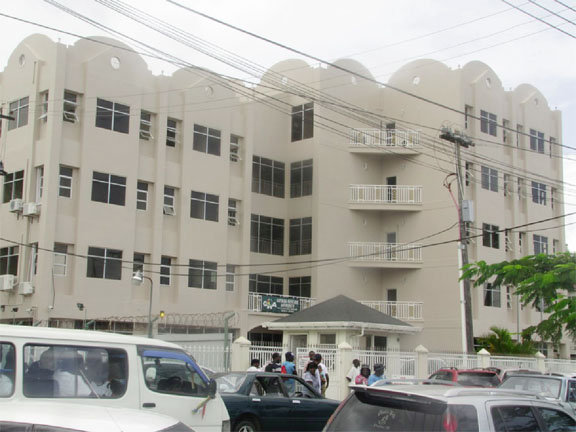
In a judgment dated July 20th, the Full Court noted that the revenue authority was lawfully recouping corporation taxes to the tune of $377,135,184 from the money-transfer and bill-payment entity from which it could not be estopped.
From 1994 up until May 2018, GKRS was assessed for corporation tax at a non-commercial rate having been incorrectly classified as a non-commercial company.
It was not until 2018 by letter dated May 17th that the GRA informed GKRS that it had been reclassified as a commercial company and that additional assessments were raised for the years 2011 – 2017 regarding its liability for corporation tax.
The letter informed the entity that it was a “commercial company” as defined in Section 2(1) of the Corporation Tax Act and that it was previously incorrectly classified as a non-commercial company.
GKRS (the respondents) objected to the reclassification and additional assessments, but GRA (the appellant) informed the company that it was maintaining its position on the reclassification and the additional corporation tax assessments.
Justice Nareshwar Harnanan had ruled last year that GKRS was not a commission agency and therefore not a commercial company as defined by the Act. The Full Court, however, overruled this decision. One of the issues which the Court had to determine was whether a commercial company as defined by the Act included all commission agencies.
The Court said that the words “and includes” as used in the Act are indisputably referable to the phrase “commercial companies” and not specifically to companies which derive at least seventy-five per cent of their gross income from trading in goods not manufactured by them.
The Full Court found that all types of commission agencies are “commercial companies” as defined in Section 2(1) thus dismissing GKRS’ contention that the use of the word “includes” is only an extension of the category of companies where at least seventy-five per cent of their gross income is derived from trading in goods not manufactured by it.
The Court then examined whether the respondent Company was a commission agency.
Highlighting that GKRS’ principal activity is the collection, remittance and disbursements of monies as an agent of Western Union Money Transfer International and as an agent for various other companies facilitating the payments of bills due to those companies, the Court pointed out that the respondent earns a commission from each transaction it processes and is therefore regarded as a commission agency.
The Full Court said that it cannot be disputed that GKRS conducts its business with third parties as an agent of Western Union in its own right while noting that it is a registered company in Guyana and not a registered subsidiary of Western Union.
It said that GKRS is subject to taxation in Guyana in its own name and not as a subsidiary of Western Union and that it can bring and defend suits before a court in its own name, as it has done and that certainly if it is not paid commission that it has earned, it can in fact file a suit against Western Union.
Finding that GKRS is an agency in fact of Western Union and since it earns by payment of commission, the Court said “then it logically follows that it is a commission agency.”
The Full Court then turned its attention to whether the respondent derives seventy-five per cent or more of its income through being a commission agency.
It noted that according to sworn affidavits, GKRS has not denied that it does earn seventy-five per cent or more of its income through the business that it does though it sought to maintain its contention that it should not be classified as an entity within the definition the Act.
The court, however, concluded that the evidence is unchallenged that the respondent derives seventy-five per cent or more of its income through being a commission agency.
The Court then dealt with the issue of whether GRA is estopped from reclassifying the respondent Company as a commercial company.
The Court said that the facts revealed that GKRS was on a previous occasion—in 2003, similarly reassessed after being re-classified as a commercial company and that GRA subsequently reconsidered the re-classification and discharged the additional assessments.
GKRS argued that since those additional assessments were discharged, the revenue authority is estopped from raising the assessments it has raised in 2017.
Describing the reasoning needed to resolve this issue as “a matter of common sense and logic, the Full Court noted that the reason/s for the discharge of the additional assessments in 2003 is not known and really is irrelevant since the finding of an officer of GRA in 2003 cannot bind it (the GRA) in the execution of its mandate in accordance with law.
The Court made it clear that it is the GRA which is tasked with enforcing compliance with Guyana’s tax, customs and related laws and that whenever and however the revenue authority became aware of the fact that the respondent was improperly classified in accordance with the law and as a result was being improperly taxed, the appellant has a lawful duty to correct such an error.
On this point the court in its written ruling said, “the appellant is not estopped from re-classifying the respondent as a commercial company since the reclassification was done in accordance with the law.”
The final issue the Court dealt with was whether GKRS had a legitimate expectation of always being classified as a non-commercial company.
On this point the Court pointed out that the Company stated no facts nor advanced any argument in support of this contention and found therefore that the principle was inapplicable in the case.
The ruling was handed down electronically via email by Justices Navindra Singh and Diana Insanally who further awarded costs to the GRA in the sum of $500,000.






